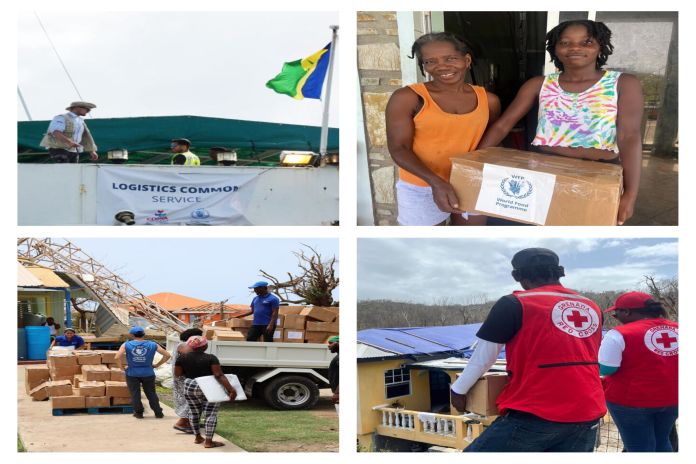By WFP Staff
Alvin Douglas was left homeless when category-4 hurricane Beryl struck the Caribbean at the start of July. “A lot of people were caught off-guard because we underestimated the (warning) bulletin, we didn’t really take it seriously,” says Douglas, a resident of Union Island in Saint Vincent and the Grenadines. “We don’t usually have hurricanes this far south.”
Hurricane Beryl, with winds of up to 240 km per hour, smashed homes, downed power lines and sank fishing and tourist boats. It is the earliest category-5 hurricane to hit the Caribbean on record.
In Barbados, the fishing trade was devastated. Between Grenada and Saint Vincent and the Grenadines, nearly 60,000 people needed urgent assistance. Large areas of Jamaica also lost electricity.
“The destruction brought by this hurricane so early in the season is a stark reminder that we must act urgently to reduce the losses of life and livelihoods to extreme weather events,” said Brian Bogart, head of WFP’s Caribbean Multi-Country Office. “We have seen the devastation and know the despair people feel. WFP is thankful to our partners for their support in getting people the food, cash, and resources they need.”
The Caribbean is no stranger to climate shocks, but increasingly erratic extreme weather conditions are causing stronger hurricanes and more devastation.
In 2019, the World Food Programme set up its first Caribbean Multi-Country Office in Barbados, teaming with national, regional, and international partners to help communities, the private sector and governments cope with climate change.
The office serves 22 countries and territories, with hubs in Belize, Dominica, Guyana, Jamaica, Saint Lucia, Saint Vincent and the Grenadines, and Trinidad and Tobago.
When crises push local resources beyond their limit, WFP steps in to augment existing capacities and directly help those affected.
Over the past five years, WFP has partnered with the Caribbean Disaster Emergency Management Agency (CDEMA) and national emergency management agencies to train local first responders in logistics, data collection and analysis, and improving systems to identify the most vulnerable people.
Additionally, WFP has donated equipment such as trucks, forklifts and temporary shelters.
Personnel from the CARICOM Disaster Relief Unit (CDRU), previously trained by WFP, were on the ground in Carriacou, Grenada, within days. They swiftly established the first of three temporary logistics hubs, with the remaining hubs to be set up in Saint Vincent and the Grenadines – to store and build up food supplies and response equipment.
WFP and CDEMA set up the CDEMA Logistics System (CLS), an online platform to track the location and availability of relief items, taking stock of their experience responding to challenges together. (A conceptual model of CLS was first used as part of the response to Hurricane Dorian in The Bahamas in 2019.)
The new CDEMA/WFP Logistics Common Service has helped to quickly and efficiently ship equipment, food, water and other essential items across the Caribbean – the first shipment sailed from Barbados to Grenada and Saint Vincent and the Grenadines just five days after the hurricane hit.
Drawing on agreements with private suppliers established ahead of the hurricane season, WFP rapidly assembled food kits to assist up to 15,000 people. Back on Union Island, Douglas was among those who received a food kit containing peas, rice, oil and tuna.
Collaboration with partners has allowed WFP to roll out the first phase of cash assistance on Carriacou Island, Grenada. WFP provided cash assistance to the hardest-hit families. Christina Peters, one of the first to receive cash assistance, said: “The storm wiped me out. I will use this money to buy my medication first and then food.”
WFP initially provided 315 families with US$260 in addition to what they receive with the regular Government of Grenada public assistance programme. Plans are underway to expand cash support to Jamaica and Saint Vincent and the Grenadines.
“CDEMA recognizes the deep collaboration with its regional and international partners like WFP which was extremely evident in delivering humanitarian relief to the countries affected by hurricane Beryl,” said the organization’s executive director, Elizabeth Riley. “The critical assistance provided by all partners including WFP, to both Grenada and Saint Vincent and the Grenadines, certainly exemplified our shared commitment to their recovery and resilience.”
As the 2024 Atlantic hurricane season progresses, all predictions indicate increased intensity and frequency of hurricanes. WFP remains vigilant and committed to cooperating with local authorities to protect the most vulnerable people.
WFP’s response to Hurricane Beryl is made possible through the generous support of our partners: the Government of Canada, Central Emergency Response Fund, the European Union, the Church of Jesus Christ of Latter-Day Saints, the United States Agency for International Development (USAID) Bureau of Humanitarian Assistance (BHA).





